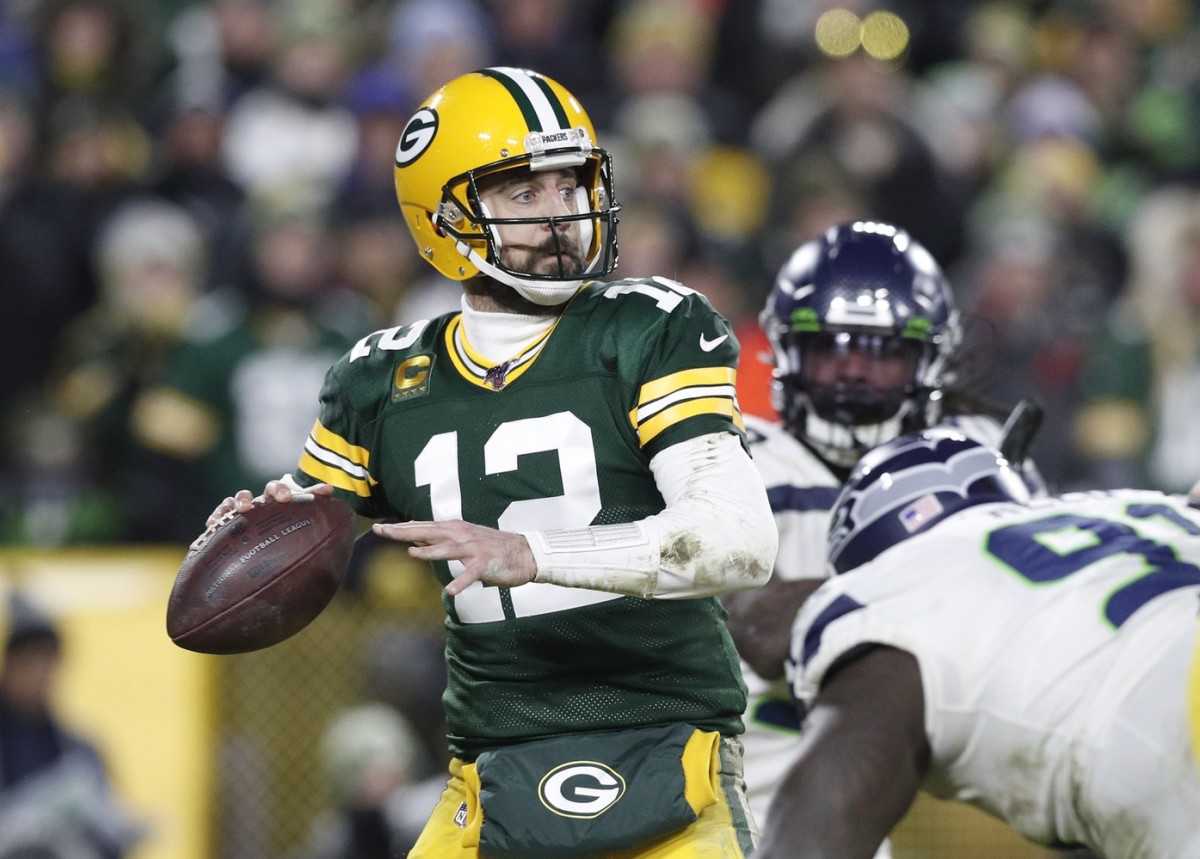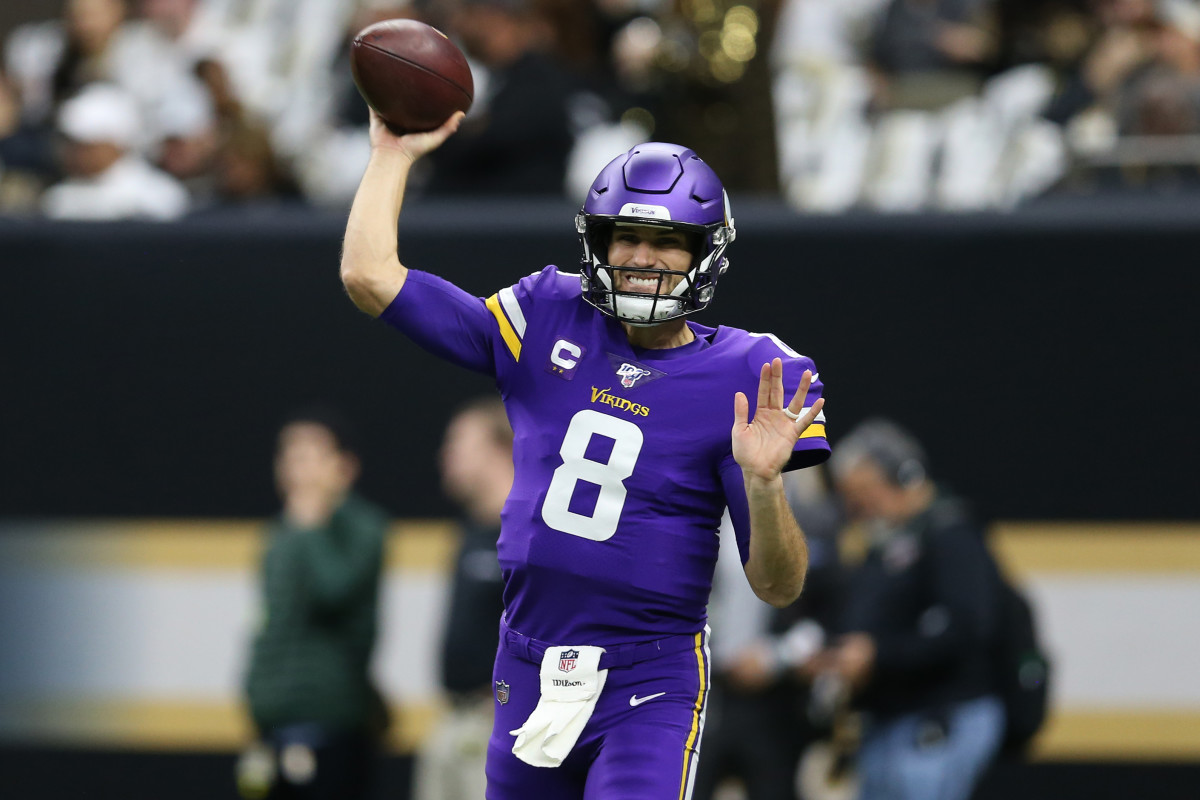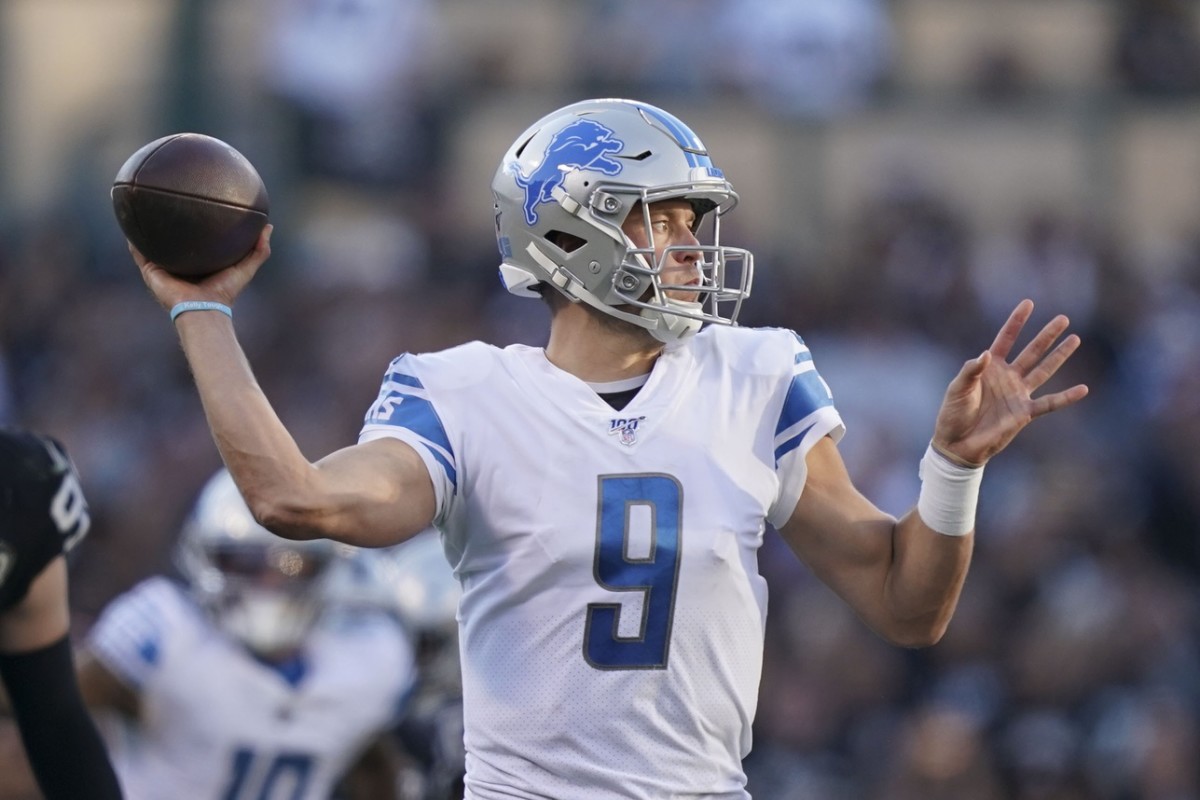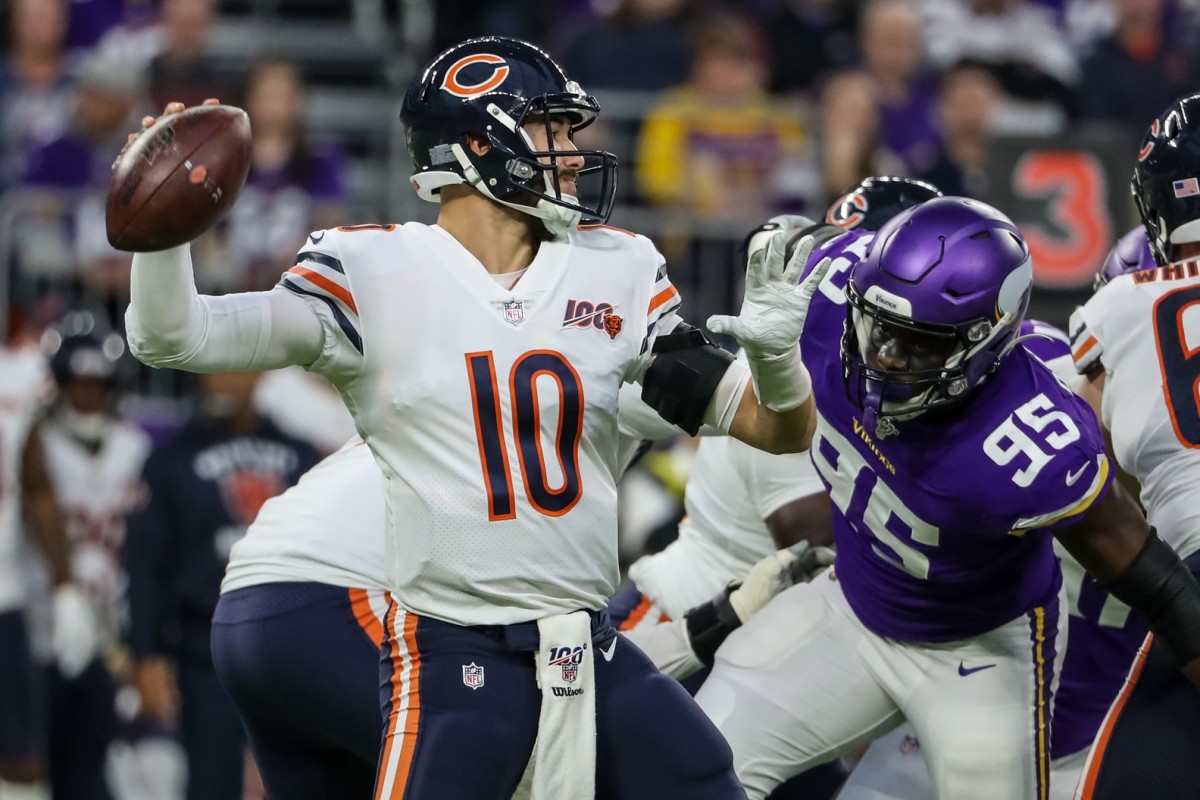NFC North QB Rankings: Kirk Cousins, Aaron Rodgers or Matthew Stafford at No. 1?
For the majority of the last decade, there was zero question about who owned the title of best quarterback in the NFC North. Aaron Rodgers won two MVP awards and made seven Pro Bowls during the 2010s, establishing himself as arguably the best all-around QB in the NFL while leading the Packers to six division titles and a Super Bowl victory.
As we enter the 2020s, Rodgers no longer has a stranglehold on that unofficial crown. Even as the Packers returned to the NFC Championship game in 2019, it's clear that the gap between Rodgers and his closest competitors in the division has closed considerably. There are now three players with legitimate arguments as the North's top signal-caller, followed by a team that is lagging behind the rest of the group at the game's most important position.
The Lions' Matthew Stafford, like Rodgers, was around for the entirety of the 2010s. The No. 1 overall pick in 2009, Stafford has lived up to expectations, pulling off the impressive feat of leading a moribund Lions franchise to four winning seasons and three playoff berths. He was better in the second half of the decade than the first, and was playing easily the best football of his career last season before being injured midway through the year.
The Vikings, desperately trying to keep up with the rest of the division, tried twice to find their own franchise quarterback via the draft. They failed both times, though for different reasons: Christian Ponder was a bust and Teddy Bridgewater's career was derailed by a horrific injury. In 2018, the Vikings made a splash by signing Kirk Cousins in free agency. And while he hasn't been perfect since then, he has given the Vikings stability and consistency at the position that they had been lacking for years. Cousins took his game to the next level in 2019 and led the Vikings to an impressive road win in the playoffs.
The Bears received merely average play from Jay Cutler early in the 2010s and whiffed on their attempt to find a new franchise QB by selecting Mitchell Trubisky over Patrick Mahomes and Deshaun Watson in 2017. They are the one team whose quarterback (whether it ends up being Trubisky or Nick Foles) is easy to place in these rankings.
So which team in the NFC North has the best quarterback right now, in 2020?
With Rodgers' play declining slightly over the past few years and both Cousins and Stafford reaching new heights in 2019, the separation between the trio has become quite small. I'll get to my rankings in a second, but let's first dive into the statistics and discuss some other contextual factors.
Cousins vs. Rodgers vs. Stafford: The Stats
There are a few ways to approach a statistical comparison of these three players. We can start by looking at the most recent data set available: the 2019 season.
This table uses a variety of QB stats that measure efficiency and effectiveness, so you won't see raw stats like passing yards, completion percentage, or touchdowns. You may have to scroll to see the full table.
Player | PFF Grade | Passer Rating | ESPN QBR | Adjusted Expected Points Added (EPA) Per Play | Completion Percentage Above Expectation (CPOE) | Yards/Attempt (Y/A) | Adjusted Net Yards/Attempt (ANY/A) | Touchdown Percentage (TD%) | Interception Percentage (INT%) |
|---|---|---|---|---|---|---|---|---|---|
Kirk Cousins | 84.1 | 107.4 | 58.4 | 0.25 | 6.5 | 8.1 | 7.7 | 5.9 | 1.4 |
Aaron Rodgers | 83.6 | 95.4 | 50.4 | 0.14 | 1.7 | 7.0 | 6.7 | 4.6 | 0.7 |
Matthew Stafford | 82.6 | 106.0 | 69.6 | 0.28 | 4.8 | 8.6 | 8.1 | 6.5 | 1.7 |
- Adjusted EPA/play and CPOE figures are from Ben Baldwin of The Athletic
- ANY/A incorporates sacks, touchdowns, and interceptions as well as yards per attempt
The main takeaway from this data is that Cousins and Stafford were definitively more efficient than Rodgers in 2019. Of the nine metrics provided, Rodgers finished third in all of them except for PFF grade and interception percentage.
The caveat with Stafford's numbers is that they are based on a smaller sample size than his competition. While Rodgers played all 16 games last year and Cousins played 15, Stafford only played eight games before suffering a season-ending back injury. Most of the numbers show that he was playing at the highest level of any of the three, but the half-season of data doesn't give us a perfect comparison.
Speaking of sample sizes, it's worth taking a look at more than just one season when analyzing players to get a more complete picture of their performance. Let's expand the comparison to include the 2018 season, giving us a full view of the three players since Cousins joined the division. Several of the stats used in the table above are only available on a season-to-season basis, so we're limited here to the stats available in Pro Football Reference's Play Index. These numbers are cumulative across 2018 and 2019.
Player | Passer Rating | Yards/Attempt (Y/A) | Adjusted Net Yards/Attempt (ANY/A) | Touchdown Percentage (TD%) | Interception Percentage (INT%) |
|---|---|---|---|---|---|
Kirk Cousins | 103.0 | 7.5 | 7.01 | 5.3 | 1.5 |
Aaron Rodgers | 96.5 | 7.2 | 6.84 | 4.4 | 0.5 |
Matthew Stafford | 95.4 | 7.4 | 6.60 | 4.7 | 1.9 |
Cousins comes across as the winner here, leading every category except for interception percentage. He also led all three players in QBR in 2018. But Rodgers was given the highest PFF grade that year, with his 89.1 grade leading Cousins (79.3) and Stafford (77.8) by a decent margin.
For one last comparison, let's expand the data to 2015 through 2019 to encompass Cousins' entire career as a starter, dating back to his time in Washington.
Player | Passer Rating | Yards/Attempt (Y/A) | Adjusted Net Yards/Attempt (ANY/A) | Touchdown Percentage (TD%) | Interception Percentage (INT%) |
|---|---|---|---|---|---|
Kirk Cousins | 99.6 | 7.7 | 7.0 | 5.0 | 1.9 |
Aaron Rodgers | 97.5 | 7.1 | 6.7 | 5.3 | 1.0 |
Matthew Stafford | 96.2 | 7.4 | 6.6 | 4.8 | 1.9 |
It's remarkable how close the three are over a five-year span, but again, Cousins comes out slightly ahead. However, these stats don't tell the full story. It's also important to consider things like each quarterback's system, offensive line, and pass-catching weapons.
Let's get to what you've been waiting for.
NFC North QB Rankings
1. Aaron Rodgers

It may be surprising to see Rodgers take the No. 1 spot in my rankings if you looked at all of the stats shown above, but there are a few reasons why he's still the best quarterback in the division. His stats in recent years can partially be explained by a lack of weapons; the Packers haven't had a player other than Davante Adams exceed 700 receiving yards since Jordy Nelson in 2016. Their second-leading receiver last year was Allen Lazard with 477 yards. Meanwhile, Cousins has had Stefon Diggs and Adam Thielen and Stafford has had Kenny Golladay and Marvin Jones.
Rodgers is the best in the division when it comes to making plays outside of the pocket and when things go off-script. His 1,300 rushing yards since 2015 are more than Cousins and Stafford have combined for in that span, so that's another element he brings to the game. Rodgers' ability under pressure, his arm talent, and his incredible lack of interceptions have made him one of the best QBs of all time. He's not as consistently great as he was from 2009 to 2014, but Rodgers posted PFF grades above 89.0 in 2016 and 2018; neither Cousins nor Stafford has ever reached an 85 grade in a season. My guess is if you were to ask NFL coaches and GMs to choose one of these three players for 2020, they'd still go with Rodgers.
He's hanging onto this spot by the skin of his teeth, though. Rodgers' advanced numbers paint a picture of a player in decline, and his lack of interceptions isn't always a good thing when he's throwing the ball away and declining to take any risks.
2. Kirk Cousins

Cousins has a compelling statistical case for the top spot on these rankings, as he was one of the most efficient quarterbacks in the entire NFL last season and has been consistently productive since becoming a starter five years ago. However, it's worth acknowledging that his career year in 2019 was aided by an offensive scheme that played perfectly to his strengths. Gary Kubiak's offense is heavy on play-action and frequently got Cousins away from pressure on bootlegs and rollouts, resulting in him being the only QB in the league to average over three seconds before passing (per Next Gen Stats).
Cousins' two main weaknesses – an inability to escape pressure and make plays outside of the pocket, and an occasional tendency to rush his checkdown instead of taking a chance at a big play – keep him from the top spot. He has also benefited from having Diggs and Thielen during his two years in Minnesota, even if Thielen missed half of last season.
Still, Cousins is right on Rodgers' heels. He is arguably the best deep-ball passer in the entire league and is remarkably accurate to all three levels. He remains underrated nationally due to pointless narratives such as his Monday Night Football record, but hopefully winning a playoff game has begun to change that.
3. Matthew Stafford

Stafford is another player who is underrated nationally. His placement on this list is not on knock on his talent – as I've mentioned, the gap between No. 1 and No. 3 is currently quite small. Stafford was on fire last season before getting hurt and would've garnered some MVP votes if he stayed healthy and continued on that pace. His arm talent and pocket presence, combined with the intangible qualities of toughness and leadership, make him a heck of a quarterback.
With that said, he's below Rodgers and Cousins because we're not just looking at his eight-game sample from 2019. Over the past five years, Stafford is below both of them in passer rating, ANY/A, and touchdown percentage. His supporting cast in Detroit hasn't always been ideal, but Stafford hasn't been perfect either. He sometimes gets caught staring down receivers, and his accuracy isn't on the same level as that of Rodgers and Cousins.
4. Mitchell Trubisky/Nick Foles

Not much needs to be said here. Trubisky is a massive bust with little hope of a career turnaround in year four. The Bears felt the need to commit a fourth-round pick and over $20 million guaranteed to Foles for the chance to go from awful to above-average at the position. If Foles can bounce back from a down year with the Jaguars, he should be an obvious upgrade over Trubisky. Even so, he's not nearly as talented as any of the three players above him on this list.
Final Takeaways
I've said it several times and I'll say it again: there's not a lot of separation between Rodgers, Cousins, and Stafford right now. Rodgers still deserves the title of the best quarterback in the division, but his decade-long run with that distinction might be coming to an end soon. He turns 37 in December, while Cousins and Stafford will each be 32 during the 2020 season.
Given the talent of those three QBs – and the potential for Foles and an elite defense to carry the Bears back into contention – we should be in for a fascinating NFC North race this year.
Join the conversation at InsideTheVikings by clicking the follow button in the upper right-hand corner of this page (mobile users, tap the bell icon), and follow @WillRagatz on Twitter.
